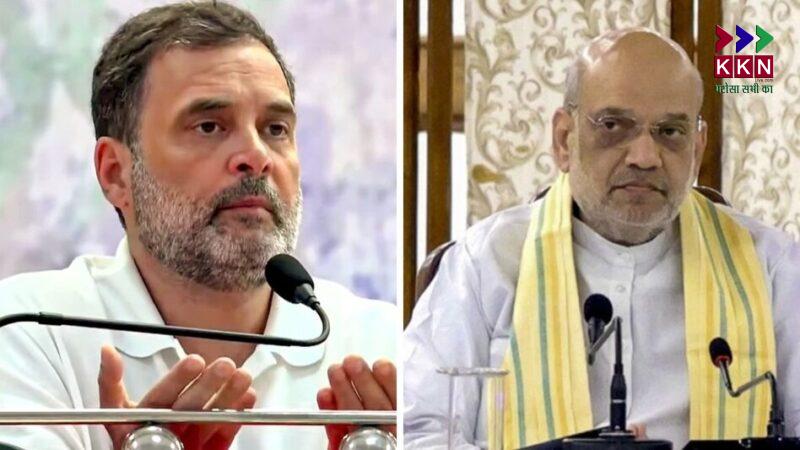
Congress leader Rahul Gandhi has once again intensified his attack on the ruling Bharatiya Janata Party (BJP) and the Election Commission, alleging large-scale “vote theft” during voter list revisions. While addressing gatherings during his Voter Adhikar Yatra in Bihar against the Special Intensive Revision (SIR) of the electoral rolls, Gandhi raised a pointed question: how does Union Home Minister Amit Shah repeatedly claim that the BJP government will last for the next 40 to 50 years?
The Core Question on Amit Shah’s Claim
Speaking in Madhubani on Tuesday, Rahul Gandhi said that Shah’s repeated statements about BJP’s uninterrupted rule for decades raise doubts. Gandhi emphasized that no one can predict what the people of India will decide in the future. According to him, only citizens know what is in their hearts, and it is “strange” for a political leader to make such a sweeping prediction.
He asked, “How can Amit Shah say this? How does he know that the BJP will remain in power for 40-50 years? The public decides the government, not the leaders themselves. When I heard this, I felt something was not right. How can someone be so confident unless they know something else?”
Allegations of Vote Theft and EC-BJP Partnership
Rahul Gandhi has been consistently alleging that the BJP and the Election Commission are working together to manipulate the voter lists. He claimed that during the recent revision exercise, 6.5 million names were removed from the rolls, yet the BJP did not register a single complaint.
According to Gandhi, this silence from the ruling party indicates collusion. “The truth is now visible to everyone. They are confident about staying in power because they steal votes. This is not new; it has been happening for years. It began in Gujarat and after 2014 expanded at the national level,” he said.
Evidence-Based Politics
Gandhi emphasized that earlier he avoided using the term “vote theft” publicly as he lacked evidence. “I speak only when I am certain. I always felt there was some wrongdoing, but I chose to wait until I had proof. Now that evidence is emerging, I can say openly that vote theft is happening in India,” he declared.
He framed the issue not only as a political challenge but as a direct attack on democracy. According to him, stealing votes is the same as stealing people’s rights, which makes it more serious than any other political controversy.
Accusations of Electoral Manipulation in Multiple States
In his Bihar rallies, Gandhi accused the BJP of manipulating election outcomes in several states. He alleged that the ruling party “stole” elections in Maharashtra, Haryana, and Madhya Pradesh with the help of the Election Commission. He also claimed that similar attempts were made in Karnataka, but the Congress exposed them in Parliament.
“From state assemblies to national elections, they have been using the same tactics. They pick and choose where they want to win by manipulating the process,” Gandhi said.
The Message to Bihar Voters
The Voter Adhikar Yatra is Congress’s latest effort to highlight electoral irregularities in Bihar. Gandhi assured the people of the state that his party, along with its allies, will not allow any manipulation of the voter rolls.
He told supporters, “Our message is clear: we will not let BJP steal votes in Bihar. They have been caught red-handed before, and this time we are more vigilant. Democracy belongs to the people, not to one party that claims it will rule for half a century.”
Political Strategy Behind the Campaign
The campaign also reflects Congress’s attempt to mobilize grassroots support ahead of the upcoming elections. By focusing on “vote theft,” Gandhi aims to tap into people’s distrust of electoral processes and position Congress as a defender of democratic rights.
The rhetoric also connects with young voters who are disillusioned with the system. By framing the debate around fairness and transparency, Gandhi is trying to shift the political narrative away from identity and towards accountability.
The Larger Context
This controversy comes at a time when debates about electoral integrity are gaining traction in India. Allegations of tampering with Electronic Voting Machines (EVMs), voter list irregularities, and misuse of institutions have been repeatedly raised by opposition parties. Gandhi’s remarks add fuel to this ongoing debate, placing Amit Shah’s long-term prediction under a critical lens.
While BJP leaders have often dismissed such allegations as baseless, the persistence of these charges keeps the issue alive in public discourse. For Congress, it is also a way to challenge BJP’s narrative of dominance and inevitability.
Rahul Gandhi’s latest remarks have reignited political debate over voter rights, electoral fairness, and democratic accountability in India. By questioning Amit Shah’s statement about BJP’s 40-50 year rule, Gandhi is not only challenging the ruling party’s confidence but also framing it as evidence of systemic manipulation.
As the Voter Adhikar Yatra continues across Bihar, the issue of “vote theft” is likely to dominate Congress’s messaging. Whether these allegations translate into political gains remains to be seen, but the debate underscores the fragile trust in electoral institutions and the high stakes in upcoming state and national elections.


